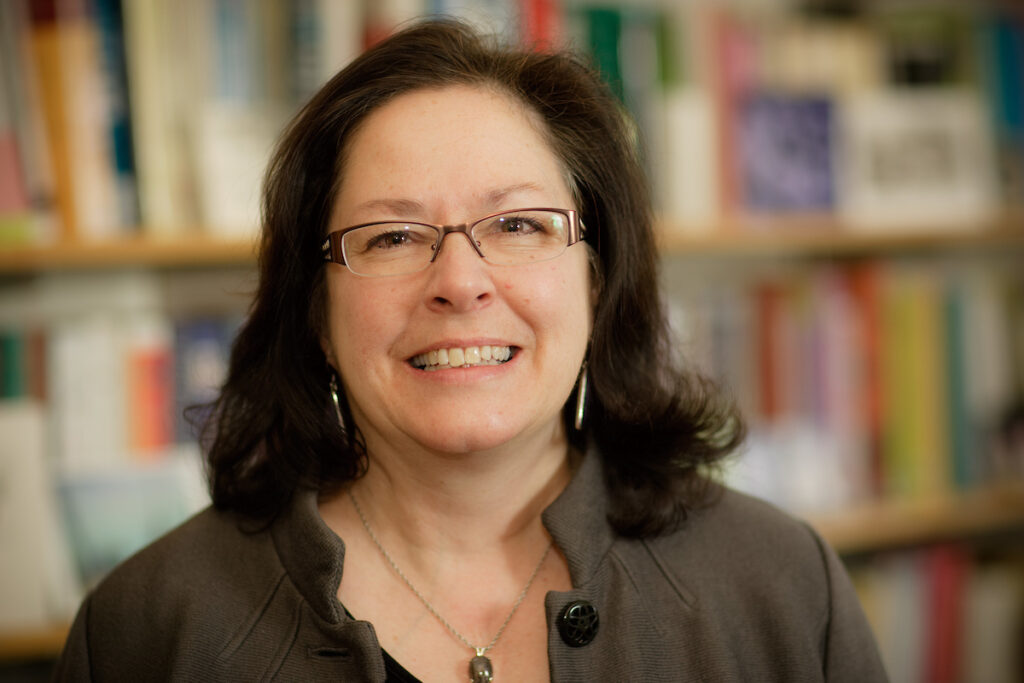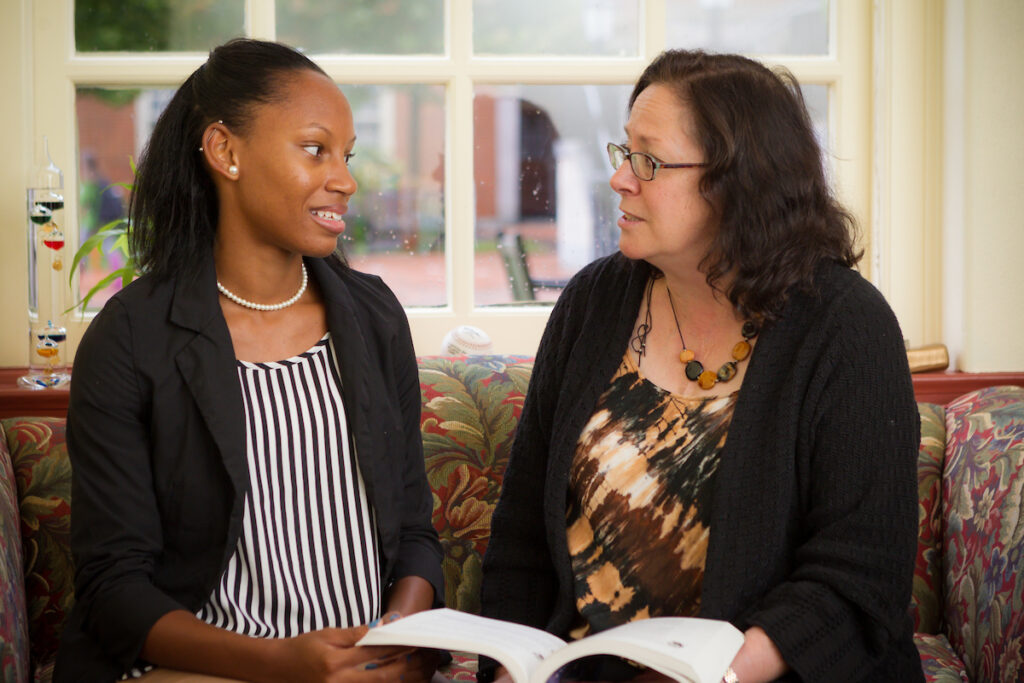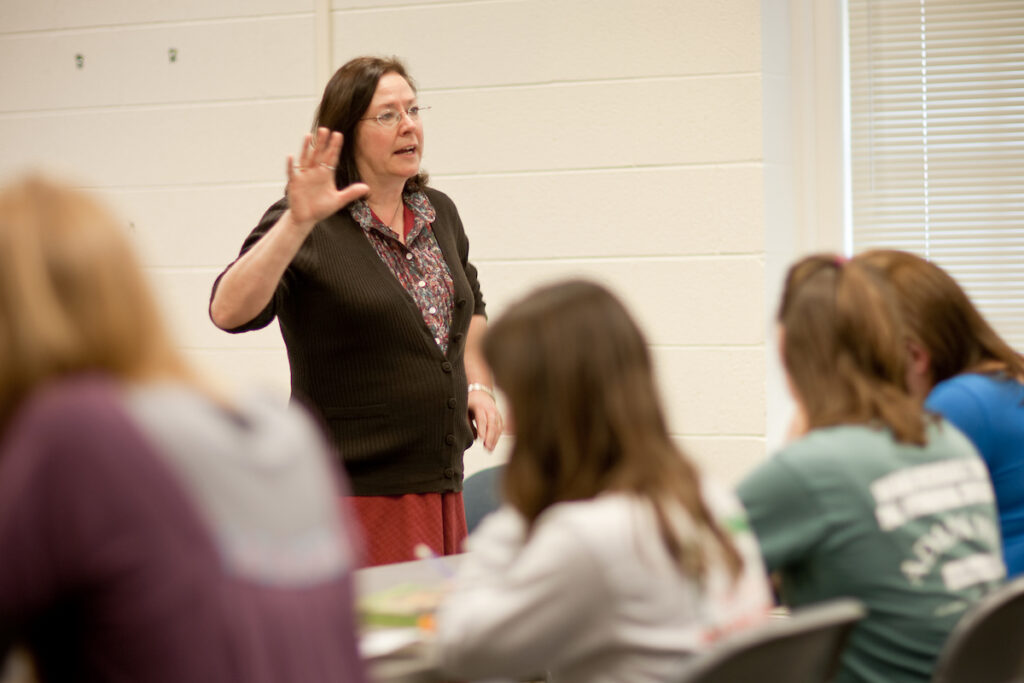Teacher-Scholar Legacies: Anne Boyle

By Jefferson Holdridge, Chair and Professor of English
Anne Boyle’s impending retirement recalls all that she has done for the English department and the university over the years. A premier and popular professor of American literature, American women’s literature, and writing since she joined the college in 1986, Anne was also instrumental in leading and growing both the Women’s, Gender, and Sexuality Studies and the Writing Programs at Wake Forest. She was Associate Dean for Student-Faculty Academic Initiatives from 2012 to 2015, and was the recipient of the College’s two highest teaching awards — the Reid-Doyle Prize for Excellence in Teaching and the Jon Reinhardt Award for Distinguished Teaching — as well as the Donald O. Schoonmaker Faculty Award for Community Service. She is the author of numerous authored and co-authored articles on writing, as well as the author of the monograph, Strange and Lurid Bloom: A Study of the Fiction of Caroline Gordon (Fairleigh Dickinson Press, 2002). Her research on writing here at Wake Forest and elsewhere continues apace, and she is preparing a manuscript focusing on künstlerroman in the work of Sarah Orne Jewett, Willa Cather, and Mary Austin. She has touched the careers of so many people across the department and campus as a mentor and model faculty member.
Jessica Richard, the former Chair of English, notes that “among many contributions to Wake Forest, Anne Boyle has been an outstanding mentor to faculty — especially women — whether they taught writing or literature. I learned so much from watching her navigate departmental and institutional barriers over many years and gradually build the institutional culture of writing that she believed in. She has been a model for me of a leader who hears and respects the voices of all participants, and who supports faculty tirelessly in their professional development. I’m grateful to have had her as a senior colleague and model faculty citizen.”

Anne acted as Director of Women’s, Gender, and Sexuality Studies in the early 2000s, providing fertile ground for institutional growth. Wanda Balzano, the founding chair of the WGSS department, recalls Anne’s leadership in these terms: “In 2004, Anne was Director of the then-called Women’s and Gender Studies Program, and welcomed me to Wake with much warmth and enthusiasm. I watched her leadership carefully and witnessed how her mentorship and encouragement have created over the years a supportive and nurturing academic environment, enabling students, staff, and faculty to thrive, and, consequently, how her influence and expertise have earned her the respect and admiration of students, colleagues, and the broader academic community. Through her selfless dedication to student encouragement and faculty mentorship, Anne has shown immense generosity and kindness to those around them. Anne’s contributions to student success, faculty, and institutional development have left a lasting legacy on the academic community. Anne’s commitment to feminist leadership is unswerving. She has always embraced a collaborative and participatory approach, one where leadership rhymes with democracy and social justice. Anne served as a supportive, generous, selfless, and dedicated leader and colleague in our unit, bringing a diverse cohort of faculty, students, and staff together. Anne’s feminist agenda at Wake has been pivotal in many areas such as advancing diversity and inclusion early on, supporting work-life balance, amplifying marginalized voices, addressing gender-based violence and harassment, and prioritizing student success. I will miss her dearly, as I continue the work which she inspired me to do.”
Anne clearly has had an influence far and wide. She was fundamental in the foundation of a Writing Program, a Writing Minor, and a Writing Center here at Wake Forest. Erin Branch, Director of the Writing Program, notes that “Anne was an invaluable mentor to me during my first few years as a teacher in the nascent Writing Program and then, later, when I took over as Director. Her model of leadership emphasized kindness, warmth, and collaboration and she advocated seemingly tirelessly for writing faculty within and beyond the Department.”
Director of the Writing Center Ryan Shirey shares a similar sentiment: “I cannot express how important Anne Boyle’s leadership, mentorship, and friendship have been to me (and so many others!) throughout our careers. When I arrived at Wake Forest years ago as a visitor, she made me feel welcome and generously invited and vigorously encouraged me to participate in the kinds of work and conversations that have gone on to shape and motivate the rest of my professional life. Much of that work was rooted in her vision, shaped through years of thought, research, and collaboration, of a new Writing Program — a program that continues to thrive in large part due to Anne’s ceaseless efforts and the strong foundations she laid. I’m still inspired by her example and profoundly grateful to her for helping me find my place in this place I’ve come to call home.”
Carter Smith, Assistant Teaching Professor of English, and Eric Stottlemyer, Associate Dean for Interdisciplinary Programs and Experiential Learning, both cite her importance to their careers and the Writing Program. Eric writes: “When I was muddling through the final year of my Ph.D. program, Anne saw potential in me that I wasn’t able to see in myself. She believed in me and what I had to offer to Wake Forest’s students, and then when she, the hiring committee, and the Department offered me the job here, I had to scramble to finish my dissertation . . . and I might not have finished it otherwise. Ten years later, I am still grateful every day I come to campus for Anne’s support, for her leadership, for her compassion, and for her devotion to our faculty and to our students. Every time I met with her — often unannounced and without an appointment — she immediately set aside whatever she was doing to give me her full attention and to help me work through whatever problem I was facing. As a teacher, administrator, leader, and as a human being, Anne has been a model of compassion, empathy, and equity who will leave behind a void the rest of us can only hope to fill.”
To which Carter adds: “I want to salute Anne’s service to the university, which, as a fellow introvert, I would characterize as positively heroic. I think that all of us in the Writing Program know — even those who arrived late or after Anne’s tenure as director — that we’ve benefitted from her leadership. To get things done, Anne always seemed to know the right person to contact or the right office to approach. But alongside that institutional know-how, she was also so, so attuned to the individual needs of her colleagues. I always felt that she did what she did with real care for us, and she did it tirelessly.”
Professor Zak Lancaster writes in a similar vein as Smith and Stottlemyer: “I first met Anne at MLA in Seattle in 2012, when she interviewed me for my current position. She somehow managed to ease my jitters, making me feel welcomed and comfortable, while also asking tough, penetrating questions about my work questions that surprised me at the time and made me think long after the interview was over. I found that these qualities lasted for the next 11 years. Anne has been my most important mentor because she is not just supportive, which she is, but she has a way of asking tough, truly thoughtful questions in that quiet, gentle voice of hers. It is an understatement to say that Anne is generous with her time and energies and supportive of all her colleagues. We in the Writing Program are here because of her inspired, supportive, and democratic spirit, and I know we will continue and grow in the example she set.” Finally, Journalism Program Director Phoebe Zerwick concludes, “I am forever grateful to Anne for welcoming me to the inaugural group of Writing Program lecturers and for guiding me with so much patience and kindness during my first year of teaching. She gave me all kinds of practical tips about grading, designing syllabi, and advising students, but most of all I learned how to build through consensus and to create community through care.”
On a personal note, Anne was equally welcoming and warm upon my arrival and continued to be the giver of good advice and fond support throughout our time together. The breadth of gratitude for her time here is not surprising. Whenever someone was in need, Anne was there to help. She brought people together both on campus and at social occasions she hosted at her house with her husband Mark Espeland from the Wake Forest School of Medicine.

From the Department of Politics and International Affairs, Katy Harriger eloquently and extensively reflects on Anne’s influence on both a personal and professional level and through the long view: “I have known Anne since she arrived on campus in 1986. I had arrived just the year before, and we were introduced at a party hosted by a member of the English Department. We hit it off right away and have been the closest of friends, as well as colleagues, since then. It is hard for me to imagine Wake Forest without her! Her contributions to the university are so legion that it is difficult to single out anything, but I want to reflect further on three things that come out on top to me. The first is her deep commitment to teaching writing. She has not just done this for several generations of students, but she has been an important mentor to faculty in other disciplines, including me, as we strive to help our students write well across the curriculum. She has led the efforts to lift up and institutionalize writing in the curriculum, and we are all better for it. The second is her deep commitment to teaching generally. This commitment was appropriately recognized early in her career with the Reid-Doyle prize and later with the Reinhardt Award for Distinguished Teaching. Anne was an important force in the establishment of the Teaching and Learning Center (now CAT). I worked with her closely in this effort and gained an even greater appreciation for her wisdom, generosity, and patience during that effort. Finally, I had the good fortune to team teach a Writing Seminar with Anne when they were first added to the curriculum. She taught me many things that semester about good teaching and writing, but perhaps the most important was to stop covering my students’ papers with red ink! ‘It makes it look like they are bleeding,’ she told me, and ever since it’s black, blue, or green ink for me (and a lot fewer tears from students when they get their papers back). Although we are peers, and I’m right behind her in retirement, Anne Boyle has been a role model for me of how to be a teacher-scholar who loves and challenges her students to be better writers and people, and a colleague who loves and challenges Wake Forest to live up to its ideals.”
These reflections capture Anne Boyle from all angles and mirror both the time and effort she has given to the university and its people.

